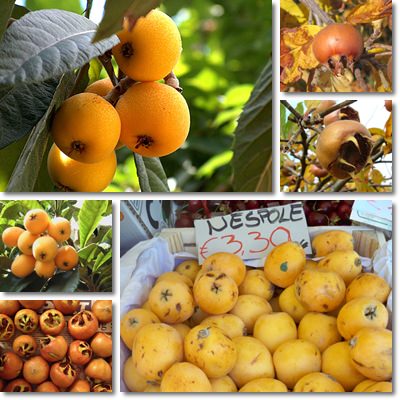Originating in the central and southern regions of China, the loquat (Eriobotrya japonica) is well-known for its soothing and anti-inflammatory properties, high vitamin A content as well as nectariously sweet-tangy taste. Its consumption is said to hold many health benefits ranging from relieving constipation and promoting digestive system health to lowering blood cholesterol levels, promoting eye health and supporting good immunity.
Loquats blossom in autumn-winter and bear fruit which ripen in late winter to early spring, provided they enjoy good weather conditions.
The species prefers either subtropical or temperate climates and does very poorly in climates with winter frosts as the trees no longer bear fruit. Loquat trees have gained incredible popularity as ornamental plants, but are found in the wild as well in mostly regions with a mild climate where they have become naturalized. The fruits are an important source of vitamin A with benefits for eyesight, the immune system and skin.
They are known for their calming effects on sore throat and traditionally used to promote expectoration of phlegm (also see article on how to get rid of phlegm).

What do loquat fruit look like?
There are almost 1000 different loquat cultivars with fruit that vary in taste, shape as well as skin and pulp color. Some cultivars are rounder, while others are more elongated or pear-shaped and most ripe into a beautiful yellow or attractive orange. While the most common cultivars have a yellow flesh, loquat varieties with white or orange flesh also exist. Generally, the fruit are about 3 cm long and may have from 1 to 10 brown seeds in the middle, 3-5 being the most common. Loquat fruit grow in clusters of around 5 or 10 and their skin is either smooth or slightly fuzzy. If you ask me, loquats look a lot like perfectly ripe, incredibly appetizing apricots.
What do loquat fruit taste like?
Usually, the fruit intended for consumption are of the sweet kind and this is how most loquats should taste like when ripe: deliciously sweet, soft and succulent with a hint of tangy. Their flavor resembles that of apples or peach combined with mango and a touch of citrus aroma. Overall, they are very fruity. As expected, unripe loquats are quite sour. If the tree does not enjoy favorable climatic conditions, grows at too low of an altitude in certain regions or comes from wild varieties enduring harsher conditions, the ripe fruit may grow to become too acidic to be consumed raw.
Loquat side effects
While the pulp and skin are edible, loquat seeds are not. Just like apricot kernels or wild almond varieties, loquat seeds contain small, yet potentially harmful amounts of cyanogenic glycosides such amygdalin which are toxic when ingested. Granted, the seeds of sweeter, commercial loquat varieties have significantly smaller amounts of the toxin compared to wild varieties. Still, it is best to discard them. Similarly, it is recommended to avoid eating loquat leaves for the same reasons (although the leaves were traditionally used as infusions for the treatment of various medical problems).

What about the benefits of Loquat?
What are loquats used for and what are they good for? Find out below the 6 most newsworthy nutrition facts and health benefits of the fruit:
Relieves constipation and promotes colon health
Loquats have 1.7 g of dietary fiber/100 g of fruit. While they may be far from the fiber content of their relative, the almond (12.5 g), they still contribute to relieving constipation by adding bulk to stools which facilitates their passing. Pectin, which is a type of dietary fiber found in fruits that make good jams, also helps retain moisture and protects the colon lining, acting both as a natural laxative and as an anti-diarrheal agent.
Soothes stomach upset
In addition to the protective effects pectin has on the colon lining, the fruit possess anti-inflammatory properties as well and thus help decrease inflammation disrupting normal digestive function. At the same time, being acidic in taste, loquats may cause discomfort to those of you already dealing with stomach acidity, ulcers or gastritis so make sure you eat the fruit in reasonable amounts.
Boasts cholesterol-lowering properties
The good amount of dietary fiber in loquats binds to part of the fat in the foods we eat and takes it with it further down in the intestinal tracts (in stools), preventing the intestines from absorbing it entirely. This process indirectly lowers high blood cholesterol levels by reducing the quantity of fats to be absorbed and thus helps promote cardiovascular health.
High vitamin A content
100 g of loquat fruit provides around 51% of the RDA of vitamin A. As you may already know, vitamin A is essential for healthy eyes and good vision. Having enough in your diet helps maintain visual acuity, improves night vision (seeing in dim light) and because part of it is made from powerful antioxidants, it protects the retina from free radicals from sunlight that may cause it to deteriorate. In addition to this, vitamin A also maintains healthy mucous membranes and supports immunity.
Soothes throat and promotes expectoration
The anti-inflammatory and soothing compounds in loquats are said to make the fruit excellent for dealing with sore throat problems due to respiratory tract infections such as colds, flu or bronchitis. The pectin in loquats acts as a natural demulcent, meaning it protects the throat mucosa allowing it to heal while relieving pain and inflammation. Loquats are also said to act as a natural expectorant.
Helps maintain a steady weight
Loquat fruit have around 47 kcal/100 g, which means they make an ideal sweet snack for anyone looking to keep a steady weight. Being deliciously sweet and fruity and an overall good source of vitamins and minerals, they are a great substitute for regular candied sweets, providing nutritious elements and energy and satisfying one’s cravings for something sweet.
Conclusion
And to end on an interesting note: did you know that loquats are related to apples, apricots, plums and strawberries? And did you know that in commercial varieties the fruit ripen at the same time while trees grown for ornamental purposes have flowers that blossom progressively and fruits that ripen gradually? Also, loquats are known under various names, the most common of which are Japanese plum or Japanese medlar, Chinese plum or nespoli in Italian.
